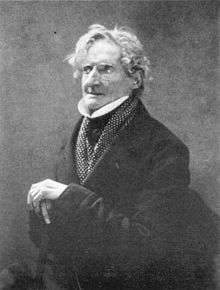Pierre-Luc-Charles Ciceri

Pierre-Luc-Charles Cicéri (Saint-Cloud, Hauts-de-Seine, 17 August 1782 – Saint-Chéron, Essonne, 22 August 1868) was a leading French set designer of his era.[1][2] He was chief set designer for the Paris Opera from 1810 to 1847, and created the set designs for over 300 ballets and operas in his long career.[3] In addition to his work at the Paris Opera, he designed for many of the leading theaters in Paris, including the Odeon, Palais-Royal, Comedie-Francaise, Theatre des Nouveautes and the Theatre de la Porte St. Martin.[4] As Painter to the King of France, he supervised the decorations for the coronation of Charles X in 1825.[4]
Cicéri designed the set for the first performance of La belle au bois dormant ("Sleeping Beauty"), which opened on 2 March 1825 at the Théâtre de l'Académie Royale de Musique in Paris. For La belle au bois dormant Ciceri created a quasi-cinematic motion effect onstage utilizing a treadmill for the actors in front of a moving cyclorama.[3] He also designed the sets for a ballet version of Jocko ou le Singe du Brésil ("Jocko or the Monkey of Brazil") by Frédéric-Auguste Blache, with music by Alexandre Piccinni. The ballet was first performed at the Théâtre de la Porte Saint-Martin in Paris on 16 March 1825.
He was awarded a Chevalier of the Légion d'honneur.
References
- ↑ Pierre-Luc-Charles Ciceri, Encyclopædia Britannica.
- ↑ Pierre Luc Charles Cicéri, artnet.
- 1 2 Lacey, Robin Thurlow (1990). A Biographical dictionary of Scenographers: 500 B.C. to 1900 A.D. New York: Greenwood Press. pp. 125–126.
- 1 2 D'Amico, Silvio (1954). Enciclopedia dello spettacolo. Roma: Casa Editrice Le Maschere. pp. 737–8.
External links
 Media related to Pierre-Luc-Charles Ciceri at Wikimedia Commons
Media related to Pierre-Luc-Charles Ciceri at Wikimedia Commons